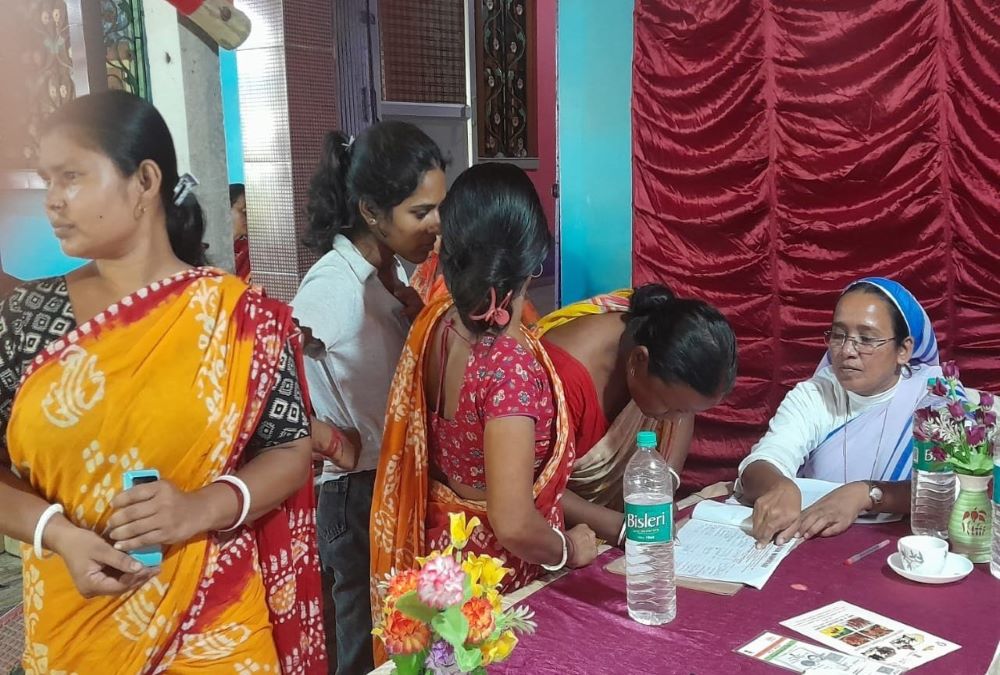
Sr. Seli Thomas, a member of the Sisters of Mary Immaculate, explains to mothers from Dalit and tribal communities a government project for them at Krishnagar, a city in the eastern Indian state of West Bengal. (Courtesy of Seli Thomas)
Sr. Seli Thomas, a member of the Sisters of Mary Immaculate from India, was among three nuns who received the inaugural Sisters Anti-Trafficking Awards (SATA) on Oct. 31.
Also honored were Sr. Patricia Ebegbulem from Nigeria and Sr. Francoise Jiranonda from Thailand. The three have been rescuing women from networks that profit from sexual and labor trafficking. Thomas won the Common Good Award for courage and creativity in addressing exploitation.
Co-hosted by Arise, the International Union of Superiors General and the Conrad N. Hilton Foundation, the awards ceremony in London drew 200 people.
Thomas, a lawyer, is based in the eastern Indian city of Kolkata. Her congregation is also known as the Krishnagar Sisters, as it was founded in a city with the same name in West Bengal, a state in eastern India.
Thomas spoke with GSR about campaigns against human trafficking and attempts to make village women self-reliant.

Sr. Seli Thomas, a member of the Sisters of Mary Immaculate, talks with villagers about ways to prevent human trafficking. (Courtesy of Seli Thomas)
GSR: How do you feel after winning the first SATA award?
Sr. Thomas: It's a mixed feeling indeed as Jesus, in his mercy, has selected me for the SATA award. I feel humbled and at the same time, happy and honored. With a grateful heart, I give all glory and honor to Jesus for enabling me to reach out to the peripheries and rescue my suffering sisters.
What does the award citation say?
The citation with the face of a woman represents all those I serve in my campaign against all forms of trafficking. It says, "The pains in the heart of this woman, of every woman, is a cry that rises to God. She bears with pride and love the broken lives, the pain of those who have suffered violence caused by trafficking, by greed for money and power."
It thanked me for all my efforts to make possible "a world without trafficking." It also reminds me about the work that still needs to be done, as well as those who need our help in the future.
When did you start your anti-trafficking mission?
In 2010, after getting my bachelor's degree in law.

Mothers learn sewing at Chougacha, a village in Krishnaganj in West Bengal, an eastern Indian state. Teaching the skill is one strategy to make women self-reliant. (Courtesy of Seli Thomas)
What prompted you to take up this mission?
Sr. Lisette Thuruthimattam, the then-superior general of our congregation, after attending the UISG plenary assembly in 2009, inspired me to venture into the anti-trafficking mission in West Bengal. Bishop Louis Larravoire Morrow [of Krishnagar] founded our congregation — the Sisters of Mary Immaculate — for evangelization and catechesis with a specific thrust toward women, girls and children.
After prayer and discernment, we realized that our ministry was to be taken up according to the signs of the times to meet the challenges and the agonizing cry of the trafficked victims.
What has been your experience fighting this global menace?
The root causes of trafficking are poverty, illiteracy and joblessness. Eradicating poverty is not possible, but we can try to reduce it in rural areas and prevent people from migrating to cities to seek jobs. This can be accomplished through sustainable programs like tailoring, handicrafts and so on.
We have managed, with our congregation's support, to supply more than 500 sewing machines that have helped women stay in [their] villages. Over the years, poverty and illiteracy have been reduced in West Bengal's rural areas.
Secondly, we gave importance to education by sending the children of the commercial sex workers to boarding schools. Today, most of those children are working after completing their studies in various subjects such as nursing.
Trafficking is a global menace. It is a huge business and slavery where people make a profit out of someone else's misery, pain and trauma. An individual or an organization cannot stop this social evil, but together we can.
Sr. Seli Thomas talks at an awareness program on anti-human trafficking at Chapra, a village in the Nadia district of West Bengal in eastern India. (Courtesy of Seli Thomas)
Could you explain your work?
This is a special mission at this challenging time. We want to save all trafficked children and women. We began this ministry by conducting awareness programs in the villages and schools of West Bengal’s Nadia district in collaboration with the panchayat [local civic body] and district administration.
When a girl goes missing, we go with the family to the police station and request help finding her. Our NGO partners also support us in rescuing these girls. The NGOs also have shelter homes for the rehabilitation of the rescued victims. Through the help of the government’s ChildLine, we stop some child marriages, too. The district child protection officer and other officers also help us.
I have faced many challenges from the traffickers, but they have only made me stronger and emboldened me to continue this mission.
Advertisement
Does your congregation support your work?
Yes, my superiors and sisters support us and have provided me with a sister companion for the mission. They have also supported me financially. We all want to save the lives of trafficked children, girls and women.
Is this your first mission in the congregation?
After my first vows, I was in the ministry of home visitation and village apostolate, teaching and instructing women and children in their homes with a senior sister. I enjoyed that ministry, but I was asked to study law.
Could you tell us something about yourself?
I was born to Thomas Thyparambil and Chinnamma Thomas in Karthedom in Ernakulam district of Kerala [southwestern India]. I have four brothers and four sisters. Our parents brought us up in faith. My parents' hard work, sacrifices and prayer life paved the way for my vocation. They were so particular about having daily family prayer, especially the rosary.
They insisted on having family meals together and sharing everything in common. They took the lead in sending us to church for holy Mass and Sunday catechism. Their prayers and sacrifices, along with my siblings, strengthened my vocation.
I joined the institute in 1991 after completing the 10th grade. My congregation asked me to complete grade 12 before accepting me as a candidate. After my first profession, I was sent for graduation and a law degree. Eventually, I plunged into the anti-trafficking mission.

Sr. Seli Thomas, a member of the Sisters of Mary Immaculate, talks to young men about anti-trafficking at Ranabondo, a village in the eastern Indian state of West Bengal. (Courtesy of Seli Thomas)
Why did you become a religious sister?
From childhood, I wanted to give my life to Jesus and serve the suffering of humanity. But I was not sure of the congregation that the Lord wanted me to join. While studying in [the eighth grade] on a Sunday during catechism, I met two sisters from my congregation who had come for vocation promotion. They gave us their leaflet explaining their life, mission and spirituality. Their jovial nature, friendly approach and pleasant smiles attracted me. Though I had met several sisters from various congregations, my attraction was towards the smiling, friendly sisters. I preserved the leaflet and prayed to the Lord for direction in accordance with his holy will.
After completion of the 10th grade, I wrote to the congregation's sisters at Kalamassery [near Kochi] who visited my home, spoke with my parents and made arrangements for my joining the congregation.
Today, when I look back, I believe the predilection of Jesus brought me to this congregation. I have no regrets about it, only gratitude to God for choosing a weak child from an interior village to serve him and his people.





